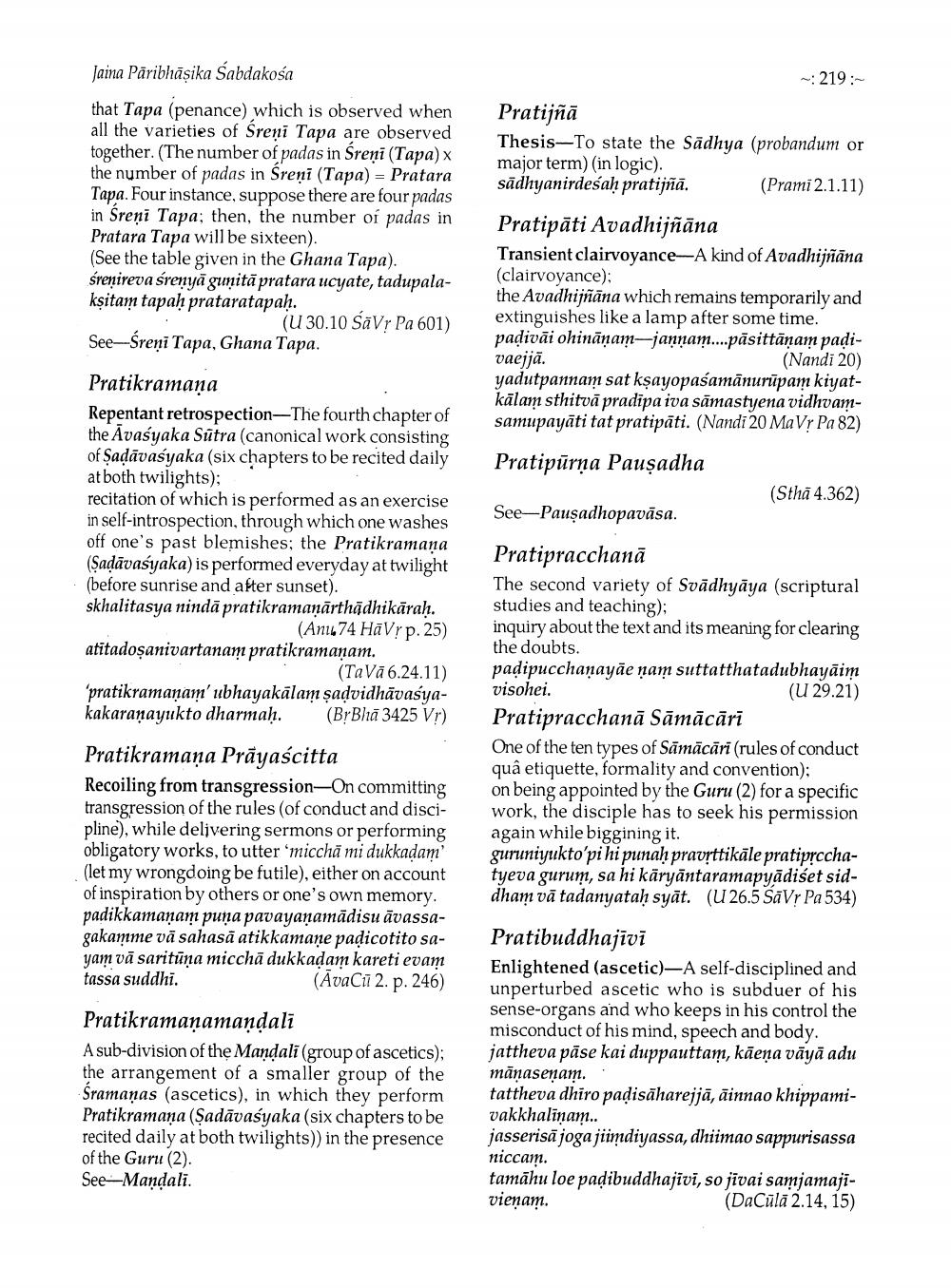________________
-219
Pratijñā Thesis-To state the Sādhya (probandum or major term) (in logic). sādhyanirdesah pratimnā. (Prami 2.1.11)
Jaina Pāribhāșika Sabdakośa that Tapa (penance) which is observed when all the varieties of Sreni Tapa are observed together. (The number of padas in Śreņi (Tapa) x the number of padas in Śreni (Tapa) = Pratara Tapa. Four instance, suppose there are four padas in Sreni Tapa; then, the number of padas in Pratara Tapa will be sixteen). (See the table given in the Ghana Tapa). śreņireva śrenyā gunitā pratara ucyate, tadupalakṣitam tapah prataratapah.
(U 30.10 SãVr Pa 601) See-Śreņi Tapa, Ghana Tapa.
Pratipāti Avadhijñāna Transient clairvoyance-A kind of Avadhijñāna (clairvoyance): the Avadhijñāna which remains temporarily and extinguishes like a lamp after some time. padivāi ohināņam-jannam....päsittäņam padivaejја.
(Nandi 20) yadutpannam sat kşayopasamānurūpam kiyatkālam sthitvā pradipa iva samastyena vidhvamsamupayāti tat pratipāti. (Nandi 20 MaV; Pa 82)
Pratipūrņa Pauşadha
(Stha 4.362)
See-Pauşadhopavāsa.
Pratikramaņa Repentant retrospection-The fourth chapter of the Avasyaka Sūtra (canonical work consisting of Sadāvasyaka (six chapters to be recited daily at both twilights); recitation of which is performed as an exercise in self-introspection, through which one washes off one's past blemishes; the Pratikramana (Şadāvasyaka) is performed everyday at twilight (before sunrise and after sunset). skhalitasya nindā pratikramanārthādhikārah.
(An474 HāVrp.25) atitadoşanivartanam pratikramanam.
(Tavā 6.24.11) pratikramanam' ubhayakālam sadvidhävasyakakaranayukto dharmaḥ. (BrBhā 3425 Vr)
Pratipracchana The second variety of Svādhyāya (scriptural studies and teaching); inquiry about the text and its meaning for clearing the doubts. padipucchanayāe nam suttatthatadubhayāim visohei.
(U 29.21) Pratipracchanā Sāmācāri One of the ten types of Sāmācāri (rules of conduct quâ etiquette, formality and convention); on being appointed by the Guru (2) for a specific work, the disciple has to seek his permission again while biggining it. guruniyukto'pi hi punah pravrttikāle pratiprcchatyeva gurum, sa hi kāryāntaramapyādiśet siddham vā tadanyataḥ syāt. (U 26.5 SäVr Pa 534)
Pratikramaņa Prāyaścitta Recoiling from transgression-On committing transgression of the rules (of conduct and discipline), while delivering sermons or performing obligatory works, to utter ‘micchä mi dukkadam (let my wrongdoing be futile), either on account of inspiration by others or one's own memory. padikkamanam puna pavayanamādisu āvassagakamme vā sahasā atikkamane padicotito sayam vā saritūņa miccha dukkadam kareti evam tassa suddhi.
(Āvacū 2. p. 246)
Pratikramaṇamandali A sub-division of the Mandali (group of ascetics); the arrangement of a smaller group of the Sramaņas (ascetics), in which they perform Pratikramana (Şadāvasyaka (six chapters to be recited daily at both twilights)) in the presence of the Guru (2) See-Mandali.
Pratibuddhajīvi Enlightened (ascetic)-A self-disciplined and unperturbed ascetic who is subduer of his sense-organs and who keeps in his control the misconduct of his mind, speech and body. jattheva päse kai duppauttam, kāena vāyā adu mānasenam. tattheva dhiro padisāharejjā, āinnao khippamivakkhaliņam.. jasserisā joga jiimdiyassa, dhiimao sappurisassa niccam. tamāhu loe padibuddhajivi, so jivai samjamajivienam
(DaCūlā 2.14, 15)




